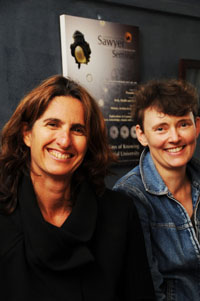Seminar tackles health from new perspective
23 November 2009
On the surface, a recent seminar titled Body, Health and Illness looked a lot like a medical gathering, what with its recurring themes of HIV, public health and traditional medicine.
Instead, the Sawyer Seminar approached these topics from another angle. Over a keynote address, a round table discussion and a four-day colloquium convened by Dr. Susan Levine of the Department of Social Anthropology at UCT, a group of international and local delegates focused on the production of knowledge (in this case, medical knowledge) and on different perspectives, or "ways of knowing" the body in health and illness.
Says Levine: "Medical anthropology offers a unique perspective for bringing into focus seemingly incommensurate ideas about disease causation, diagnosis and treatment. The papers in the Sawyer series highlight the politics of such differences from a global perspective, and offer models that lean towards integration and collaboration rather than conflict and competition."
"The UCT Sawyer Seminar project asks crucially important questions about contestations over knowledges and ways of knowing within the postcolonial university, across regions in the Global South," explains Dr Lesley Green, who leads the team in the Department of Social Anthropology that won (in 2008) the Andrew Mellon Foundation grant to host the seminar series.
In the colloquium, UCT and regional scholars had an opportunity to sit down with some of the leading thinkers in medical anthropology, renowned for their work on the Global South. These included Professor Veena Das, who holds the chair of anthropology at Johns Hopkins University in the US and has written extensively on the subject in India; Professor Judith Farquhar, who holds the chair of anthropology at the University of Chicago and has performed acclaimed work on traditional Chinese medicine; and Professor Renee Devisch, a medical anthropologist who has focused on African healing and the place of indigenous knowledge at African universities.
In posing questions about knowledge, the UCT Sawyer Seminar is aligned closely with the Programme to Enhance Research Capacity of the Carnegie Foundation in looking at ways in which UCT can engage with questions on the transformation of knowledge, notes Green.
"The colloquium engaged with everyday philosophies and practices across regions; it compared the ways in which debates about indigenous or traditional knowledge play out differently in different contexts; it explored comparative epistemologies - different ways of producing knowledge - and the value of practical or tacit knowledges, whether held by a medical practitioner or a traditional healer."
 This work is licensed under a Creative Commons Attribution-NoDerivatives 4.0 International License.
This work is licensed under a Creative Commons Attribution-NoDerivatives 4.0 International License.
Please view the republishing articles page for more information.









